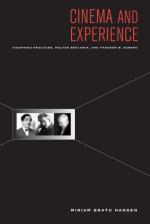|
This section contains 7,819 words (approx. 27 pages at 300 words per page) |

|
SOURCE: “Language for One, Language for All: Adorno and Modernism,” in Perspectives on Musical Aesthetics, edited by John Rahn, W. W. Norton & Company, 1994, pp. 21-39.
In the following essay, originally published in French in 1988, Rochlitz locates Adorno's place in aesthetic modernity.
Modernity can be assigned a minimalist as well as a maximalist definition. In the first case, one would go back to the birth of modern subjectivity, to the Renaissance, the Reformation, the French Revolution, and modernity would be understood as the perpetual re-questioning of the normative criteria on which a posttraditional society is founded, as a chronic tension between the demands of profitability, of efficaciousness, of maintenance, and the demands of validity, of the autonomous logics in the sciences, of norms, and of arts.1 From this perspective, the historical catastrophes of the nineteenth century do not justify the verdict which denounces modern reason as such. In the...
|
This section contains 7,819 words (approx. 27 pages at 300 words per page) |

|


